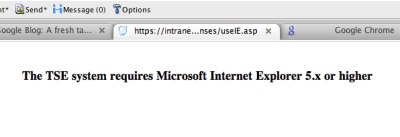You may have seen the news that Google is launching its own (open source) browser, codenamed Chrome. According to the company blog,
Under the hood, we were able to build the foundation of a browser that runs today’s complex web applications much better. By keeping each tab in an isolated “sandbox”, we were able to prevent one tab from crashing another and provide improved protection from rogue sites. We improved speed and responsiveness across the board. We also built a more powerful JavaScript engine, V8, to power the next generation of web applications that aren’t even possible in today’s browsers.
In reality, this takes us back to the original threat/promise of Netscape — the thing that threatened Microsoft so much that it set out to destroy Netscape. This was the idea that the browser was destined to become the key piece of software — almost an operating system in its own right.
Google Chrome takes up that idea, and holds out the promise of making it a reality. As Nick Carr puts it, Chrome
promises a similar leap in the capacity of the cloud to run applications speedily, securely, and simultaneously. Indeed, it is the first browser built from the ground up with the idea of running applications rather than displaying pages. It takes the browser’s file-tab metaphor, a metaphor reflecting the old idea of the web as a collection of pages, and repurposes it for application multitasking. Chrome is the first cloud browser.
See the exposition in Google’s Comic Book for an outline of the thinking that went into Chrome. It’s basically the first multi-threaded browser.
This is an important strategic move by Google. To quote Carr again,
Google is motivated by something much larger than its congenital hatred of Microsoft. It knows that its future, both as a business and as an idea (and Google’s always been both), hinges on the continued rapid expansion of the usefulness of the Internet, which in turn hinges on the continued rapid expansion of the capabilities of web apps, which in turn hinges on rapid improvements in the workings of web browsers.
To Google, the browser has become a weak link in the cloud system – the needle’s eye through which the outputs of the company’s massive data centers usually have to pass to reach the user – and as a result the browser has to be rethought, revamped, retooled, modernized…
I’ve no doubt that this development will be presented in the mainstream media as Google’s “attempt to capture the browser market”. That would be a misconception IMHO. By making Chrome open source Google is ensuring that any browser that seeks to stay competitive has to take up the multi-threading idea. Which will make cloud computing even more pervasive. Which will further increase Google’s importance. As a strategy, it’s fiendishly clever.
And just in case the folks in Cupertino are sniggering, this is a harbinger of things to come on the mobile phone front too. Google has sussed that the (closed) iPhone will be difficult to beat, so its attack is based on an open platform (Android). Smart.
Many thanks to Gerard for the original link (even though he hates the Comic Book!)
LATER: I can’t run Chrome because the first beta release only runs under Windows Vista (if you please), but TechCrunch has been using it and likes it a lot.
STILL LATER: Kate Greene has a useful overview in Tech Review. And the Register published a perceptive piece by Tim Anderson.

